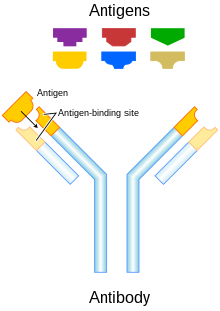
Back العلاج بالأضداد وحيدة النسيلة Arabic درمان با پادتن مونوکلونال Persian Մոնոկլոնալ հակամարմինային թերապիա Armenian Biološka zdravila Slovenian Терапія з використанням моноклональних антитіл Ukrainian 單株抗體治療 Chinese

Monoclonal antibodies (mAbs) have varied therapeutic uses. It is possible to create a mAb that binds specifically to almost any extracellular target, such as cell surface proteins and cytokines. They can be used to render their target ineffective (e.g. by preventing receptor binding),[1] to induce a specific cell signal (by activating receptors),[1] to cause the immune system to attack specific cells, or to bring a drug to a specific cell type (such as with radioimmunotherapy which delivers cytotoxic radiation).
Major applications include cancer, autoimmune diseases, asthma, organ transplants, blood clot prevention, and certain infections.
- ^ a b Yao S, Zhu Y, Chen L (February 2013). "Advances in targeting cell surface signalling molecules for immune modulation". Nature Reviews. Drug Discovery. 12 (2): 130–146. doi:10.1038/nrd3877. PMC 3698571. PMID 23370250.